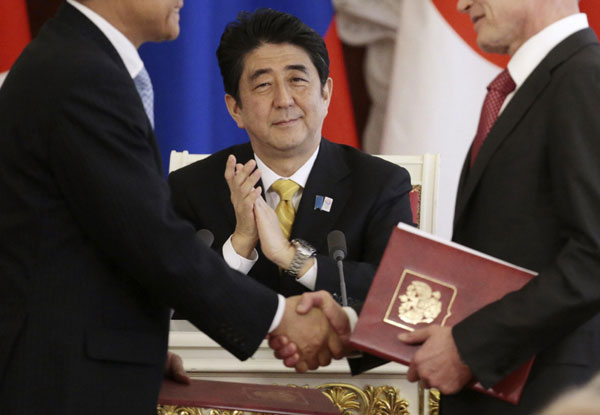News Analysis: Abe's visit to Russia 'neutral to positive'
Updated: 2013-05-01 12:00
(Xinhua)
|
|||||||||||
MOSCOW - Talks between Russian President Vladimir Putin and visiting Japanese Prime Minister Shinzo Abe can be viewed as "neutral to positive" because economic issues prevailed over territorial disputes, local experts say.
Putin and Abe agreed during their talks to move their positions closer on certain issues and pledged negotiations to reach a World War II peace treaty delayed nearly seven decades because of a territorial dispute.
Putin and Abe also signed a number of economic deals and, most importantly as the Japanese prime minister said, created "personal trust" between the leaders.
Positive for Russia, moderate for Japan
 |
|
Japan's Prime Minister Shinzo Abe applauds during a signing ceremony after the talks with Russia's President Vladimir Putin at the Kremlin in Moscow, April 29, 2013. [Photo/Agencies] |
Expectations for Abe's visit varied between Moscow and Tokyo because the two countries had different objectives, Sergei Louzyanin, deputy director for the Far East Institute of Russian Academy of Science, told Xinhua.
"For Russia, the results are fairly positive as Moscow effectively coerced Abe to fade the territorial dispute's aspects and highlight deeper economic cooperation as a ground for bilateral relations," Louzyanin said.
That certainly was not what Tokyo would happily agree to but Abe, the first Japanese prime minister in 10 years to officially visit Russia, did not leave Moscow empty-handed.
That's because Putin agreed to restart talks over the islands dispute that has prevented the two countries from signing a World War II peace treaty for some 70 years.
The four islands near Japan's Hokkaido, known as the Northern Territories in Japan and the Southern Kurils in Russia, were seized by Soviet troops in the final days of the war.
Even though Putin said the dispute would not be settled immediately, it was better than nothing for Abe, Louzyanin said.
"Abe has not brought the disputed islands back to Japan, but he established personal relations with Putin, which gives him a certain degree of hope that in future, however distant, the territorial dispute will be settled one way or another," Louzyanin said.
Alexander Panov, the former Russian ambassador to Tokyo, told Xinhua that "the visit has demonstrated that Russia and Japan have generally normal relations."
"At least, they are no worse than Moscow has with some western countries," Panov said.
An egg today better than a hen tomorrow
Panov said Abe's visit could not be called a failure for Tokyo despite no substantial breakthroughs on the territorial issue.
That's because more than 150 Japanese business leaders who traveled to Moscow with Abe signed deals in a wide range of industries, including agriculture, autos, ship building, and natural gas supplies.
Abe, Panov said, had opted for a "better an egg today than a hen tomorrow" approach during his visit to Moscow. That was mostly because the Japanese had moderate expectations on the islands dispute and "wisely preferred not to push it too hard," Panov said.
To maintain a positive atmosphere, both leaders were happy to highlight what they had in common instead of emphasizing their differences, Panov and Louzyanin said.
Putin and Abe demonstrated their common approach to the nuclear problems on the Korean Peninsula and in Iran, praised the business deals signed in Moscow and used soft rhetoric when reporters asked them about the thorny issues.
"The aims set by Abe were rather modest and they have been reached. The Japanese prime minister did not set any tasks which would be a sure failure," Panov said.
Related Stories
Russia, Japan try to bridge gaps on thorny issues 2013-04-30 09:44
Russia, Japan condemn DPRK nuclear refusal 2013-04-30 00:04
Today's Top News
Abe's visit to Russia 'neutral to positive'
Xi meets model workers
Sky's the limit for business aviation
Sculpting the souls
Paying the price to travel
Mental health law to take effect
Lamb stands the test of time
Dual education offers win-win solution
Hot Topics
Lunar probe , China growth forecasts, Emission rules get tougher, China seen through 'colored lens', International board,
Editor's Picks

|

|

|

|

|

|





